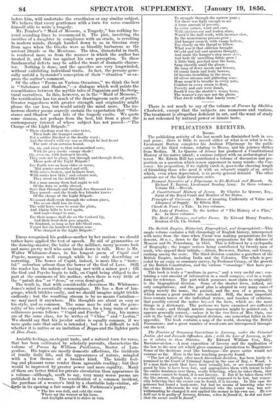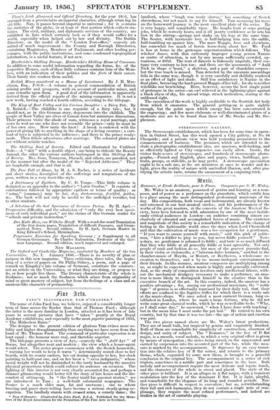PUBLICATIONS RECEIVED.
BOOKS.
The publishing activity of the last month has diminished both in esse and posse ; there is little to record either of what is or what is to be. Lieutenant Burton completes his Arabian Pilgrimage by the publi- cation of his third volume, relating to Mecca, and his journey thither from Medina. M. Le Quesne of Jersey has produced a Constitutional History of his native island ; a curious subject with an archaeological in- terest. Mr. Edwin Hill has contributed a volume of discussion and pro- position on a question which is now uppermost in many minds—the Cur- rency : his proposition, if we rightly catch it, goes to the cheering length of furnishing those who need it with an adequate supply of an article which, even when depreciated, is in pretty general demand. The other arrivals are of the light literature order.
Personal Narrative of a Pilgrimage to El-Medinah and Meccah. By Richard F. Burton, Lieutenant Bombay Army. In three volumes. Volume III.—klece"ah.
A Constitutional History of Jersey. By Charles Le Quesne, Esq., Jurat of the Royal Court and Member of the States.
Principles of Currency : Means of insuring Uniformity of Value and Adequacy of Supply. By Edwin Hill.
Claude de Vesci : a Tale. In two volumes.
The Lady of Fashion. By the Author of "The History of a Flirt," &c. In three volumes.
The Maid of Messene and other Poems. By Edward Henry Pember, Student of Ch. Ch. 'Oxford.
The British Empire' Historical, Biographical, and Geographical.—This ample volume contains a full chronology of English history, interspersed with notes from the time when Omar was making preparations for his descent, 56 B. c., down to the Russian preparations for the defence of Moscow and St. Petersburg, in 1855. This is followed by a cyclopredia of Biography ; the longer notices being contributed by twenty men of mark, who append their initials,—Alison, Brewster, Burton, and Creasy, ranking among the score. The third division contains a gazetteer of the British Empire, including India and the Colonies. The whole is pre- ceded by an essay or summary survey, by Professor Creasy, of the growth of the British Constitution, and the various " crossings " that have pro- duced the British race.
This book is truly a " multum in parvo," and a very useful one ; con- taining a vast amount of information in a small compass and in a ready form for reference. The part which possesses most claim to originality is the biographical division. Some of the shorter lives, indeed, are only compilations ; and the good plan is adopted in very many cases of giving merely the name, the pursuit, and the rent of a person, by which means a great number are included. Still, the more important lives contain traces of the individual writer, and touches of criticism, that possibly extend the notice beyond the facts, which are the main things in a dictionary. The portions we have examined are sufficient for the scale ; and though minute inaccuracies might be pointed out, it appears generally correct,—unless it be the two lives of Mrs. Opie, one curt in the body of the biographical division, one somewhat fuller in the appendix. The book contains a map of the world, showing the British Possessions • and a great number of wood-cuts are interspersed through- out the text.
The Practice of Summary Convictions in Larceny, under the Criminal Justice Act and Juvenile Offenders Acts ; with the Law of Larceny, so far
as it relates to these Statutes. By Edward William Cox, Esq., Barrister-at-law.—A neat exposition of larceny and the application of the law to the new act which gives summary jurisdiction to Magistrates. Some of the decisions read like burlesque—for grave satire would not venture so far. Here is the law touching property found. "The law of finding, after much discordant decision, has been lately de- termined in the Court of Criminal Appeal in the case of Reg. v. Wood. 1. If a man finds goods that have been actually. lost, or are reasonably sup- posed by him to have been lost, and appropriates them with intent to take the entire dominion over them, really believing, when he takes them, that the owner cannot be found, it is not larceny. 2. But if he takes them with the like intent, though lost, or reasonably supposed to be lost, but reason- ably believing that the owner can be found, it is larceny. In this case the prisoner had found a bank-note, but had no means of knowing who was the owner. Afterwards he was informed who the owner was, but not- withstanding he c it and applied the money to his own use. He was held not to be guilty o larceny, because, when he found it, he did not know that the owner could found." Thom's Irish Almanack and Official Directory, for the year 1816, has emerged from a provincialto an imperial character, although retairing its old title. Nay, it passes beyond imperial to universal ; for it ccntains the statistics of the globe, or at least of that portion which collects sta- tistics. The civil, military, and diplomatic services of the country, are exhibited in lists which certainly look as if they would suffice for a world, especially when helped out by law and divinity. The Dublin Directory, on the model of the " London Post-office," scarcely ad- mitted of much improvement : the County and Borough Directories, containing Magistrates, Members of Parliament, and other leading per- sonages, with the public institutions, and some condensed topographical information, is a useful feature, if not new.
Hardwicke's Shilling Peerage. Hardwicke's Shilling House of Gun mans. In addition to some useful information regarding the forms, &c. of the respective Houses, each of these little volumes contains lists of the Mem- bers, with an indication of their politics and the facts of their career. Their handy size renders them useful.
British Mines considered as a Means of Investment. By J. H. Mur- chison, Esq., F.G.S.—A volume in general commendation of British mining profits and prospects, with an account of particular mines, and some remarks upon them. A good deal of the information is'apparently derived from the official reports of the mining companies. It is not a new work, having reached a fourth edition, according to the titlepage.
The King of Root Valley and his Curious Daughter ; a Fairy Tale. By R. Reinick.—The childlike is one requisite of a fairy tale • but it should not, as in this German story, degenerate into the childish. The people of Root Valley are elves of human form but miniature dimensions. Their princess visits the abode of man, witnesses a royal marriage, and vows to wed no one who does not resemble the prince—only he must be of her own size. How untie the ]sot? A brook is endowed with the power of giving life to anything in the shape of a living creature ; a cart- load of toys is subjected to its influence ; and there is the prince ready- made. Then follow adventures after marriage. The coloured plates are not without artistic touches.
The Shilling Book of Beauty. Edited and illustrated by Cuthbert Bede.—A " skit" with a double object, one being to ridicule the Beauty Annual, the other the various authors burlesqued in this Shilling Book of Beauty. Mrs. Gore, Tennyson, Disraeli, and others, are parodied, not in the manner but after the model of the " Rejected Addresses." They are laughable enough, and that is all.
The Poor Folk at Home, by M. A. S. Barber, is a series of incidents and short stories, descriptive of the sufferings and temptations of the poor, written in a very tract-like style.
A Dictionary of Epithets. By C. D. Yonge.—This little volume is designed as an appendix to the author's "Latin Gradus." It consists of substantives followed by appropriate epithets or terms of quality ; as " restas," (summer,) may be hot, dry, duet-causing, fruitful, golden, &e. The book will not only be useful to the unfledged versifier, but to other students.
A Selection of the best Specimens of German Poetry. By H. Apel.- Progressive difficulty and the admission of " only the very best speci- mens of each individual poet," are the claims of this German reader for "schools and private instruction."
Das Halle Herz, von Wilhelm Haul: With a word-for-word Translation of the first dozen pages, Translation of difficult Passages, and Gram- matical Notes. Second edition. By H. Apel, German Master in King Edward's School, 13irmingham.
Progressive Exercises for Speaking German ; a Supplement to all German Grammars. By Charles Eulenstein, Professor of the Ger- man Language. Second edition, much improved and enlarged.
NEW MAGAZDTE.
The Oxford and Cambridge Magazine, conducted by Members of the two Universities. No. I. January 1856.—There is no novelty of plan or purpose in this new magazine. Three criticisms, three tales, the begin- ning of a series of papers on Sir Philip Sidney, a poem, and a page of remark on Kingsley's late volume of Sermons, constitute the contents : not an article on the Universities, or what they are doing, or propose to do, or how people live there. The literary characteristic of the whole is
freshness ; not so much the freshness which arises from originality of mind or great mastery of subject, but from the feelings of a class and an amateur-like character of penmanship.































 Previous page
Previous page